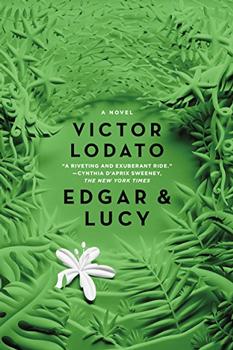Summary | Excerpt | Reading Guide | Reviews | Beyond the Book | Readalikes | Genres & Themes | Author Bio

Poor Ma, thought Edgar. A butcher, a killer of pigs.
"Are you cooking him dinner?"
"Don't be ridiculous. Does it look like I'm cooking him dinner? We're going out."
"Bed," she said, swatting the boy's bottom.
Edgar sauntered away in mock desolation, dragging his feet. When he turned to look at her from the doorway, she was lost again in the mirror, applying a second layer of frosting.
* * *
Edgar looked at himself in his own mirror. Pale skin, white hair, tired eyes a sea-glass shade of green. I should have oinked, he thought. He tried it out, but it wasn't nearly as good as the dog. He'd have to practice the pig. With his index finger he pushed up his nose. It was stunningly effective.
He was a small boy, skinny, with knobby knees that were constantly bumping into things. Wrists so thin the bones rose like the lurky eyes of an alligator. In movement he was awkward; in stillness he possessed a natural grace, remarkable van Eyck hands, a long neck worthy of Pontormo. But in the mirror all the boy saw was an insect. He didn't make sense; not to himself. Though he understood his paleness was a disease, it often seemed a curse. People stared. Plus, he lacked the meat of his fellow humans, the meat of his mother, his grandmother. He was more like the dead. More like his father.
"You don't eat," Lucy was always saying.
But he did eat. He made an effort, anyway.
"One pea at a time," Lucy once said to a friend.
"I do not!" Edgar had shouted. "I eat lots of peas at the same time."
When both women laughed, the boy stormed out of the room, nearly sick from the ferocity of his blushing.
"Leave him alone," the grandmother would say. She was even larger than his mother, but she didn't mind Edgar's bones. She didn't mind that he was more like the dead, considering the fact that the dead man in question, Edgar's father, was her own son.
The boy tiptoed into the hallway and peered into the old woman's room. She was asleep on her back, her great Jiffy-Pop bosom moving up and down with comforting regularity. He walked straight into the dark bedroom without making a sound. One of the good things about being an insect, Edgar thought: no one can hear you when you walk across the floor. Most people made a lot of noise. Most people stomped. His mother was a stomper. And, with one footfall heavier than the other—a telltale limp for which Edgar knew no tale—the sound was hers, and hers alone. You always knew when she was coming.
The old woman, on the other hand, for all her heft, could appear suddenly behind you, out of nowhere. If she weren't a person you loved, she might terrify you. "The creeper," Lucy called her. Sometimes Lucy jolted at the creeper's unexpected materializations and Edgar would have to suppress a laugh. It was funny to see his fearless mother jump at the sight of a fat old lady. It was a great routine. It never failed. Edgar wondered if the two of them rehearsed it while he was at school.
Entering his grandmother's bedroom at night (he'd done it before) felt like entering a cave where animals lived. He wasn't scared. A small white votive candle housed in a blue glass cup burned at all hours, and at night threw a living splash of light on the face of Mary. The whole room was enlivened in a gentle but peculiar way. The room seemed larger, and then smaller, and then, if you stood very still, you could feel the light moving on your body, making you part of the mysterious scheme. The candlelight was up to something, Edgar knew. He could feel its miraculous little brain ticking away.
The boy touched Mary's small plaster head. He liked the way her clasped hands warmed themselves over the fire, like the bums on Tulaney Avenue when the weather turned cold. Great sparking flames leaping from trash cans. "Don't stare," his grandmother would say if the two of them were walking by. But Edgar couldn't help himself. To him, the bums seemed wonderful, living, as they were, in their play town of cardboard boxes and rags and plastic bags. They were like Boy Scouts gone bad. One afternoon Edgar had locked eyes with a particularly ravaged man in a yellow ski jacket—a fringy red scarf wrapped around his head like a pirate. He'd winked at Edgar, making the boy blush. It almost felt as if the man had kissed him.
Excerpted from Edgar and Lucy by Victor Lodato. Copyright © 2017 by Victor Lodato. Excerpted by permission of St. Martin's Press. All rights reserved. No part of this excerpt may be reproduced or reprinted without permission in writing from the publisher.
Your guide toexceptional books
BookBrowse seeks out and recommends the best in contemporary fiction and nonfiction—books that not only engage and entertain but also deepen our understanding of ourselves and the world around us.